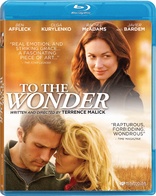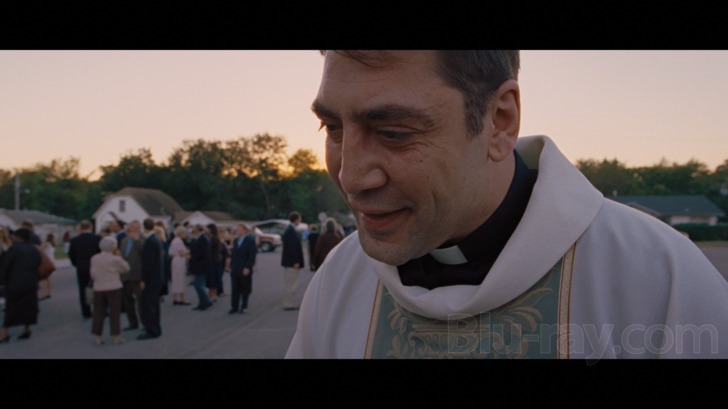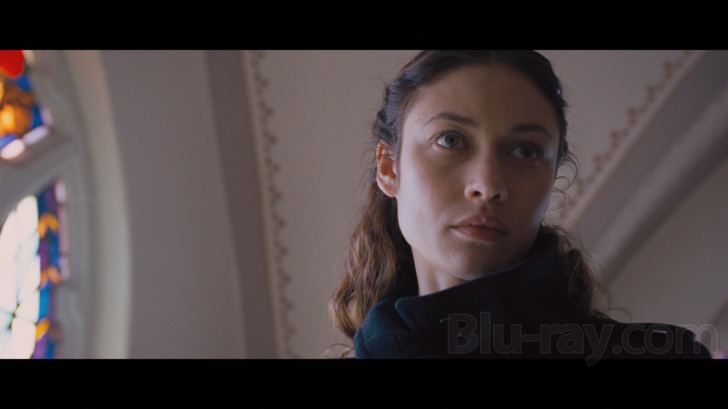To the Wonder Blu-ray Movie
HomeTo the Wonder Blu-ray Movie 
Magnolia Pictures | 2012 | 113 min | Rated R | Aug 06, 2013
Movie rating
6.8 | / 10 |
Blu-ray rating
| Users | 4.8 | |
| Reviewer | 4.0 | |
| Overall | 4.7 |
Overview
To the Wonder (2012)
After a whirlwind romance in France, Neil and single mother Marina move to Oklahoma to start a new life together. But as Marina struggles to adjust to life in the United States and cracks begin to appear in their relationship, Neil seeks solace by getting in touch with Jane, a former flame from his childhood. Meanwhile, Marina befriends Father Quintana, a priest struggling to come to terms with his calling.
Starring: Ben Affleck, Olga Kurylenko, Rachel McAdams, Javier Bardem, Tatiana ChilineDirector: Terrence Malick
| Drama | Uncertain |
| Romance | Uncertain |
Specifications
Video
Video codec: MPEG-4 AVC
Video resolution: 1080p
Aspect ratio: 2.35:1
Original aspect ratio: 2.39:1
Audio
English: DTS-HD Master Audio 5.1 (48kHz, 16-bit)
Subtitles
English SDH, Spanish
Discs
25GB Blu-ray Disc
Single disc (1 BD)
Playback
Region A (locked)
Review
Rating summary
| Movie | 4.0 | |
| Video | 4.5 | |
| Audio | 4.5 | |
| Extras | 3.0 | |
| Overall | 4.0 |
To the Wonder Blu-ray Movie Review
"Love is not only a feeling. Love is a duty. You show love."
Reviewed by Casey Broadwater August 5, 2013Easily the most divisive work in the recent career renaissance of philoso-filmmaker Terrence Malick, To the Wonder was jeered and
applauded at its Venice Film Festival premiere, praised by the late Roger Ebert—in his last-ever review for the Chicago Sun-Times—and has since been
shredded and defended in just about every online film forum. There are generally two camps: 1.) Those who dismiss the movie outright as a story-less,
pretention-laden waste of time, and 2.) those who appreciate the ways in which Malick plays at the far boundaries of conventional cinema, even when
he's not entirely successful. I fall unreservedly into the latter group; I'm almost always willing to give the benefit of the doubt to filmmakers—especially
U.S. filmmakers—who work outside the norms, particularly because there are so few American directors still following the auteurist dream of New
Hollywood that died out with the advent of the summer blockbuster.
At the same time, I don't want to dismiss those who don't—or won't—enjoy the film, because the fact is, it's just not for everyone. I certainly don't
want to come off as saying "If you didn't like To the Wonder, it's because you didn't get it." Because, really, there's not much to get.
Yes, Malick has a reputation as a philosophical filmmaker—he translated Heidegger and briefly taught at MIT—but his films, especially this one, are far
more experiential and intuitive than rigidly intellectual. They're built around a sense of what Heidegger called being-in-the-world, a grounding state of
mindfulness towards sheer everyday existence, recognizing that humans are in and of the world, and not separated from it inside a "cabinet of
consciousness." The lofty themes of Darkness and Light, Strife and Love, Nature and Grace are there if you wish to parse them out, but they are
secondary to bare feeling and Malick's Romantic suggestion of all things shining—the wonder of life, of being here at all, of everything that
is. You don't so much watch a Terrence Malick film as much as you let it wash over you in waves.

The mysteries of existence are paramount to Malick, and the greatest of these is love. Where does it come from? Why does it fade? Can two ever truly become one? At its simplest—and this is a simple film—To the Wonder is the chronicle of a failed relationship, told through a series of fractured memories. Based on what little we know about the infamously reclusive director's private life, it's also clearly autobiographical to a large degree. While living in Paris during his long break from cinema between 1978's Days of Heaven and 1999's The Thin Red Line, Malick fell in love with a neighbor, Michèle Morette, and moved with her and her daughter from a previous relationship to Texas, where they got married and—eventually— divorced. Shift the names, dates, and places around a little, and you basically have the gist of To the Wonder's minimalist story.
More focused and less narratively elliptical than the sweeping Tree of Life—which jumped around between the birth of the cosmos, a nuclear 1950s family, and the fiery end of time—To the Wonder is mostly told in order. A stoic Ben Affleck plays the Malick stand-in, Neil, who has a whirlwind Parisian love affair with the gorgeous Marina (Olga Kurylenko), a single mother with a pre-teen daughter (Tatiana Chiline) from a youthful indiscretion. When Neil takes a job as a soil-tester for an oil company—Malick's own father was an oil man—he brings them from France to deep rural Oklahoma, where they live in a bland, barely-furnished house in a generic subdivision out on an endless open plain strung with power lines. The contrast to the culture and old-world architecture of Paris is strong, and Marina has trouble adjusting. She returns to France—during which time Neil strikes up a less tempestuous relationship with the wholesome rancher Jane (Rachel McAdams), an old flame—but Marina soon comes back sans her daughter for what amounts to a green-card marriage. The passion and intimacy of her and Neil's early relationship inexorably gives way to adultery and suspicion, resentment and hopelessness. Love is hard.
In all its forms. If Neil and Marina are the archetypal Man and Woman, caught in the throes of romantic love—eros—the character of Father Quintana (Javier Bardem) represents agápe, the unconditional, spiritual sense of the word. In a subplot that owes a lot to Ingmar Bergman's Winter Light, Quintana—the lonely local priest in this small Oklahoman town—tends to the needs of his poor and downcast parishioners while inwardly questioning what remains of his own faith. ("Why do you turn your back?" he asks of his god. "All I see is destruction. Failure. Ruin.") His doubts are assuaged somewhat by the beauty of serving others and the blind act of choosing to believe.
This may be all that happens in the film—and it isn't much, superficially—but Malick evokes so much more in sub-text, in the subtle shading of emotions and in the way he chooses to piece everything together, giving us small snatches of seemingly incomplete scenes, hinting rather than making explicit. Since The Thin Red Line, the director has been progressively moving towards shorter and shorter units of narrative, and in To the Wonder he slashes out exposition and pares down each sequence with Godard-ian jump-cuts and sudden transitions, arriving at an impressionistic quality that may be a turn-off for those expecting a more traditional editing style. Each shot is a memory that blazes and burns out. Each scene is a haiku-like glimpse into the characters' lives, the small details suggesting the wider whole.
Even more than The Tree of Life, To the Wonder is Malick at his most personal and most Malick-y, for the lack of a better word. The glowing backlit golden hour shots. The pensive interior monologues. The propensity for female characters to run through fields with arms outstretched, or else cautiously run their hands through the tops of tall grass. To the cynic, To the Wonder may seem to approach self-parody, and there were even a few moments when I—admittedly something of a Malick apologist—wished he would dial it back a bit. At the same time, and despite several imitators, no one is making films quite like Terrence Malick today. You get out of them what you put into them, which is not, however, to say that you need to exert some monumental effort to properly enjoy them. All To the Wonder requires is a sense of patient, open mindfulness. You don't have to take it apart, just take it in.
To the Wonder Blu-ray Movie, Video Quality 

Whatever your thoughts on the film's other merits, you can't deny To the Wonder's dazzling beauty, shot with the same floaty, ethereal camerawork that graced The Tree of Life. This is cinematographer Emmanuel Lubezki's third film with Malick—his first was The New World—and they've definitely established an aesthetic together, defined by natural lighting, deep depth of field, and swooping Steadicam movements that suggest some ghostly third party observing the ongoing events. Somehow, the image has both a documentary realism and a near-spiritual quality. No surprise, the film looks fantastic on Blu-ray, with a 1080p/AVC-encoded transfer that's true to source, free from distractions, and lovely to watch. Clarity is excellent throughout, and color is accurately expressed, from the warm glow of Malick's characteristically backlit golden hour shots, to the morose grays of a snow on the Oklahoma plains. Filmed primarily on 35mm, the picture is fine-grained and untouched by digital noise reduction or any other kinds of unnecessary filtering. A few other formats were selectively used too. The scenes with Rachel McAdams' character were actually shot on 65mm—in a great interview with American Cinematographer, Lubezki claims this was to express "stability and a kind of hyper-reality"—and there are two digitally-shot scenes, one utilizing sleek nighttime Paris footage from the Red camera, and a flashback made with a toy Japanese camera that creates a degraded-but-nostalgic look.
To the Wonder Blu-ray Movie, Audio Quality 

If you have the Blu-ray editions of The Tree of Life, The New World, or The Thin Red Line, you'll be familiar with the intertitle that Malick splashes on the screen before his (recent) films begin, recommending that viewers turn the volume up loud for the best experience. The suggestion is well worth taking. Sound design is clearly important to Malick, and To the Wonder's lossless DTS-HD Master Audio 5.1 surround track does indeed sound terrific with your receiver set a few notches higher than usual. I was a bit put-off at first that Magnolia's Blu-ray doesn't include the 7.1 mix that was featured in the U.K. release, but there's nothing lacking in this 5.1 track. From start to finish, it's expansive and dynamic, clear and enveloping. The rat-a-tat clatter of a train on its tracks. The deep tolling of bells. The rumble of worksite bulldozers. The quiet hush of a room with the windows open. The effects and ambience are involving and oh-so-carefully mixed. Behind this is the film's ever evolving, mood-setting soundtrack, which features an impressionistic score from 26-year-old composer Hanan Townshend, as well as classical pieces from Tchaikovsky and Haydn, Górecki and Wagner. The music is a wonder itself—lively, room-filling, and rich. Drifting in and out of all this are the film's small snatches of dialogue and voice-over narration, which are clear and understandable when they're supposed to be. The disc includes optional English SDH and Spanish subtitles.
To the Wonder Blu-ray Movie, Special Features and Extras 

- The Making of To The Wonder (HD, 10:25): A short behind-the-scenes pieces—featuring interviews with the cast and producers—that reveals some of the peculiarities of working with Terrence Malick on this project, from the lack of a formal script and the use of entirely natural light, to fact that Malick gave his actors intensive reading assignments in order to better understand their characters.
- The Actors' Experience (HD, 5:54): Many of the same interviews above are repurposed into a featurette about the actors's trying to capture the chaos of life.
- The Ballet (HD, 5:59): This one's focused on the "ballet" that is the production of a Terrence Malick movie, which involves following the light, trusting intuition, and encouraging spontaneity and improvisation.
- Local Flavor (HD, 4:55): The small town of Bartlesville is the focus here, complete with the real-life people Javier Bardem's character interacts with in the film, most notably, the "preaching cowboy" Tony O'Gans.
- Theatrical Trailer (HD, 1:59)
To the Wonder Blu-ray Movie, Overall Score and Recommendation 

Many quickly pegged To the Wonder as a "lesser" Terrence Malick film, but there's nearly as much here bubbling beneath the surface as there was in The Tree of Life. The nature of love, the love of nature, the silence of God and the beauty of compassion—To the Wonder is alive with meaning and feeling. Some may not be able to get past Malick's narrative ambiguities—or, conversely, his penchant for occasionally being too obvious about what he's trying to say, thematically—but those who appreciate the director's decidedly un-Hollywood approach will find his latest film rewarding. Not to mention gorgeous. Aside from the awful cover art—which is apparently trying to sell the movie to fans of more conventional romances —Magnolia's Blu-ray release is appropriately wonderful, with a striking transfer, incredibly detailed sound design, and a few worthwhile extras that reveal a little of the method behind Malick's madness. Recommended!
Similar titles
Similar titles you might also like

Knight of Cups
2015

Little Women
2019

Love 3D
2015

Casablanca 4K
80th Anniversary Edition
1942

Jules and Jim
Jules et Jim
1962

Before Midnight
2013

Coco Chanel & Igor Stravinsky
2009

Wings
1927

Pierrot le fou
1965

Days of Heaven 4K
1978

Past Lives
2023

Disobedience
2017

Fedora
1978

Laurence Anyways
2012

The Red Shoes 4K
1948

Amélie
Le fabuleux destin d'Amélie Poulain
2001

Wuthering Heights
2011

Magnificent Obsession
included with "Magnificent Obsession" (1954) release
1935

At Eternity's Gate
2018

The Tree of Life
2011